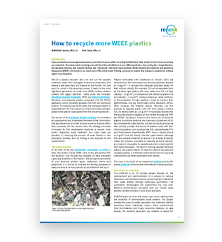Recyclers’ challenge to purify plastic infamous reputation
12 February 2021

Plastic is recyclable, but at a cost. That's why industries prefer low-price treatments. "We are wasting reusable materials,” says engineer Mathilde Taveau.
Every narrative needs someone wearing a black hat.
For decades, environmentalists have found their villain in plastic waste. And, alas, it’s a well-earned title! The European Environment Agency (EEA) claims that the world has recycled less than 10% of plastic between 1950 and 2015, and landfilled or dumped in nature, oceans included, 60%.
In this bleak scenario, plastic recyclers face a dual challenge today. The first is advocating for a more responsible and sustainable treatment of plastic. The second is showing producers that recycled plastics are as sturdy and safe as raw materials.
“Changes happen if we work together,” says Mathilde Taveau, a chemical engineer at Coolrec, a Renewi subsidiary. “The EU still processes plastic waste abroad or overseas. While businesses see it as a cheaper option, the plastic can end up in facilities that lack technologies to recover valuable materials and, in response, they discard it. This trend must stop!”
Closing the loop with plastic
While policymakers and consumers must demand greener solutions from plastic producers, Taveau plays her part by researching how to clean, repair, and reuse more materials from discarded electronic products. In this way, she cuts carbon emissions and promotes local solutions that make plastic processing more circular.
Yet, the challenge in her job starts at the source as, in today’s market, plastics differ for the types of additives or substances used to meet consumers’ needs and EU regulations. That means that the more plastic is “mixed”, the higher the ante for recyclers to sort, process and re-input it in the market maintaining its original strength and ductility.
"Society may think of the recycling market as a discount supermarket," says Taveau. "That's not the case. At Coolrec, our quality tests prove that our recycled plastic is safe and high-performing as raw materials. The EU must keep on strengthening export regulations and eco-design guidelines to help recycling facilities better process, and recycle, materials that would be otherwise discarded."
Leading the charge in purifying hazardous plastic
One of the most used substances inside discarded electronics is brominated flame-retardant. No matter their efficiency in preventing your TV or laptop from turning ablaze during short-circuits, the EU has restricted their use and disposal due to their harming effects on our health or the environment.
Taveau's current research for the EU project CREAToR plans to recover 45% of plastics that would instead head to the incinerator. Thanks to a technique with infrareds to sort reusable plastic from contaminated materials, Coolrec aims to purify, repair and recycle more and more plastic in the incoming future.
“The CREAToR project shows that we, at Coolrec, have more and more solutions to tackle incoming challenges,” says Taveau. “Plastic is a great material. If recyclers, legislators, producers and consumers alike cooperate, it can play a pivotal role in the circular economy.”
Would you like to know more about the CREAToR project? Find out more in the document below.
| The project named in this paper has received funding from the European Union’s Horizon 2020 research and innovation programme under Grant Agreement no. 820477 Note: This paper reflects only the author’s view. The funding agency is not responsible for any use made of the information it contains. |
Coolrec is a Renewi Specialities subsidiary and a key European player in the circular economy when it comes to the processing of discarded electrical appliances and electronic products. Through its international network comprising nine different sites spread throughout the Netherlands, Belgium and France, Coolrec produces secondary raw materials, such as plastics and both ferrous and non-ferrous metals, recovering them from WEEE (Waste Electrical and Electronic Equipment). This activity involves Coolrec working in close cooperation with innovative industrial manufacturers of consumer products. We also supply high-quality ICT components back into the market, once they have been dismantled and checks have been carried out. For more information, visit: www.coolrec.com


